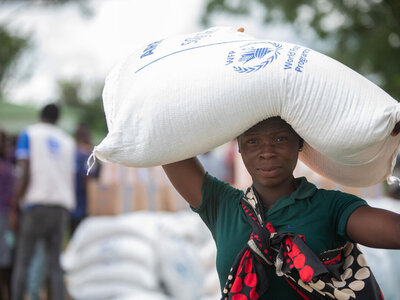Mozambique
- 50%-plus
- of people cannot afford a nutritious diet
- 38%
- of children under 5 are stunted
- 35 million
- population
Mozambique is a low-income, food-deficit country with a large rural population of 20 million. It ranked 183 of 191 countries in the 2023 Human Development Index. HIV is the primary cause of death.
A record 5 million people are food insecure and need urgent support.
A vast majority of Mozambicans are too poor to afford a nutritious diet, and malnutrition remains a major underlying cause of child mortality in children under 5.
Mozambique is also one of the most disaster-prone countries in the world and one of the most vulnerable to extreme climate events such as droughts, floods and cyclones. These, coupled with annual lean seasons and economic shocks, regularly threaten food security.
El Niño-induced drought – one of the most intense in Mozambique’s recent history – has devastated crops, resulting in poor harvests and soaring food prices. Furthermore, cyclones Chido and Dikeledi have affected 680,000 people.
Ongoing conflict is driving hunger in Cabo Delgado and in its neighbouring provinces, Niassa and Nampul, which are both hosting internally displaced people in need of urgent lifesaving and life-sustaining humanitarian assistance.
The World Food Programme (WFP) supports the Government, with a focus on improving food and nutrition security as well as strengthening the resilience of individuals and communities in the face of multiple shocks. We delivered life-saving food assistance to 1 million people in 2024, though our support had to be reduced to 520,000 people due to lack of funding.
What the World Food Programme is doing in Mozambique
-
Emergency response
-
WFP provides food assistance, livelihood activities – including providing seeds and agricultural kits – nutrition support and school meals. To ensure that food assistance reaches those most in need, WFP has launched vulnerability-based targeting in Cabo Delgado, to assist 480,000 vulnerable individuals affected by conflict.
-
Nutrition and HIV
-
WFP’s approach includes fresh-food vouchers and nutrition-smart agriculture. WFP provides life-saving assistance in shock affected-areas, focusing on children under 5 and pregnant and breastfeeding women and girls.
-
Climate resilience
-
WFP focuses on natural-resource management, sustainable agriculture, climate services, financial inclusion and disaster risk financing, to enhance community resilience and sustainable development.
-
Disaster risk management and social protection
-
In 2023, the Government activated anticipatory actions supported by WFP, in response to El Niño-induced drought, assisting over 270,000 people with early-warning messages, agricultural asset creation and cash-based transfers. WFP uses innovative technology to conduct assessments and enable anticipatory humanitarian action and disaster response. WFP works with the Government to enhance the shock-responsiveness of the national social protection system.
-
School meals
-
WFP supports the National School Feeding Programme, by providing hot meals to students using locally sourced food. The programme expanded in 2022, with WFP's support, and the Government took over food procurement for 340 schools and reached 240,000 students. WFP also provides nutrition education, gender-sensitive training, school gardens and infrastructure development in an additional 141 schools.
-
United Nations Humanitarian Air Service
-
The United Nations Humanitarian Air Service (UNHAS), managed by WFP, provides a safe, effective and efficient air transport service for humanitarian workers. It enables the delivery of life-saving assistance in hard-to-reach locations in northern Mozambique, to support people in areas where there are no other means of transportation due to insecurity and inaccessible roads. UNHAS is especially crucial during the cyclone season.
Mozambique news releases
Go to pageFind out more about the state of food security in Mozambique
Visit the food security analysis pageOperations in Mozambique
Contacts
Office
Rua 1109, perpendicular a Av. Paulo Samuel Kankhomba, Malhangalene A, KaMpfumo, Maputo
Mozambique







